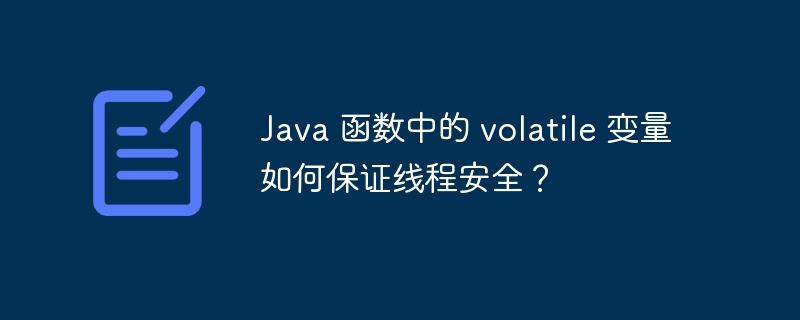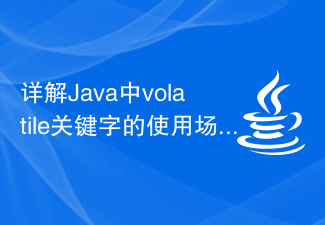Methods to ensure thread safety of volatile variables in Java: Visibility: Ensure that modifications to volatile variables by one thread are immediately visible to other threads. Atomicity: Ensures that certain operations on volatile variables (such as writing, reading, and comparing exchanges) are indivisible and cannot be interrupted by other threads.

#How do volatile variables in Java functions ensure thread safety?
Volatile variables are Java variables that ensure that variables are visible and ordered in a concurrent environment. By using the volatile keyword to modify variables, you can prevent multiple threads from changing the same variable at the same time, thereby achieving thread safety.
How to use volatile variables
To declare a variable as volatile, just add the volatile keyword before the variable declaration:
private volatile int counter;
How volatile variables work
Volatile variables are thread-safe through the following mechanism:
- Visibility: Any changes modified by volatile variables are immediately visible to all threads. This means that after one thread writes the value of a volatile variable, other threads can immediately see the updated value.
- Atomicity: Certain operations on volatile variables, such as ordered writes, ordered reads, and compare-and-swap, are atomic. This means that these operations will be performed as an indivisible unit and will not be interrupted by other threads.
Practical case
The following is an example of using volatile variables to achieve thread safety:
public class Counter {
private volatile int count;
public void increment() {
count++;
}
public int getCount() {
return count;
}
}In this example, the count variable is Declare as volatile to ensure that a race condition does not occur when two threads call increment() at the same time. When a thread calls getCount(), it will see the updated count value because volatile variables guarantee visibility.
Conclusion
volatile variables are a simple and effective way to achieve thread safety in Java functions. By modifying a variable with the volatile keyword, you can prevent concurrent access to the variable from causing data inconsistency.
The above is the detailed content of How to ensure thread safety of volatile variables in Java functions?. For more information, please follow other related articles on the PHP Chinese website!
 C++ 函数参数传递方式与线程安全的关系Apr 12, 2024 pm 12:09 PM
C++ 函数参数传递方式与线程安全的关系Apr 12, 2024 pm 12:09 PM函数参数传递方式与线程安全:值传递:创建参数副本,不影响原始值,通常线程安全。引用传递:传递地址,允许修改原始值,通常不线程安全。指针传递:传递指向地址的指针,类似引用传递,通常不线程安全。在多线程程序中,应慎用引用和指针传递,并采取措施防止数据竞争。
 Python中如何实现一个线程安全的缓存对象Oct 19, 2023 am 10:09 AM
Python中如何实现一个线程安全的缓存对象Oct 19, 2023 am 10:09 AMPython中如何实现一个线程安全的缓存对象随着多线程编程在Python中的越来越被广泛应用,线程安全性变得愈发重要。在并发环境中,多个线程同时读写共享资源时,可能会导致数据不一致或者意外的结果。为了解决这个问题,我们可以使用线程安全的缓存对象来保证数据的一致性,本文将介绍如何实现一个线程安全的缓存对象,并提供具体的代码示例。使用Python的标准库thre
 Java 函数中的 volatile 变量如何保证线程安全?May 04, 2024 am 10:15 AM
Java 函数中的 volatile 变量如何保证线程安全?May 04, 2024 am 10:15 AMJava中volatile变量保证线程安全的方法:可见性:确保一个线程对volatile变量的修改立即对其他线程可见。原子性:确保对volatile变量的某些操作(如写入、读取和比较交换)是不可分割的,不会被其他线程打断。
 Java集合框架中的并发控制和线程安全Apr 12, 2024 pm 06:21 PM
Java集合框架中的并发控制和线程安全Apr 12, 2024 pm 06:21 PMJava集合框架通过线程安全集合和并发控制机制来管理并发性。线程安全集合(如CopyOnWriteArrayList)保证数据一致性,而非线程安全集合(如ArrayList)需要外部同步。Java提供了锁、原子操作、ConcurrentHashMap和CopyOnWriteArrayList等机制来控制并发,从而确保多线程环境中的数据完整性和一致性。
 详解Java中volatile关键字的使用场景及其作用Jan 30, 2024 am 10:01 AM
详解Java中volatile关键字的使用场景及其作用Jan 30, 2024 am 10:01 AMJava中volatile关键字的作用及应用场景详解一、volatile关键字的作用在Java中,volatile关键字用于标识一个变量在多个线程之间可见,即保证可见性。具体来说,当一个变量被声明为volatile时,任何对该变量的修改都会立即被其他线程所知晓。二、volatile关键字的应用场景状态标志volatile关键字适用于一些状态标志的场景,例如一
 Java并发编程之volatile与JMM多线程内存模型实例分析May 27, 2023 am 08:58 AM
Java并发编程之volatile与JMM多线程内存模型实例分析May 27, 2023 am 08:58 AM一、通过程序看现象在开始为大家讲解Java多线程缓存模型之前,我们先看下面的这一段代码。这段代码的逻辑很简单:主线程启动了两个子线程,一个线程1、一个线程2。线程1先执行,sleep睡眠2秒钟之后线程2执行。两个线程使用到了一个共享变量shareFlag,初始值为false。如果shareFlag一直等于false,线程1将一直处于死循环状态,所以我们在线程2中将shareFlag设置为true。publicclassVolatileTest{publicstaticbooleanshareFl
 C++编译错误:不能调用从volatile类型转换的成员函数,怎么处理?Aug 21, 2023 pm 09:28 PM
C++编译错误:不能调用从volatile类型转换的成员函数,怎么处理?Aug 21, 2023 pm 09:28 PMC++是一门强类型语言,严格限制了变量的类型转换,但是在某些情况下,我们可能需要对volatile类型对象进行类型转换,特别是在嵌入式开发中,我们常常需要访问硬件寄存器,而这些寄存器通常都是volatile类型的。然而,由于volatile类型的对象具有特殊的语义,所以C++编译器会对其进行一些特殊的限制,这就导致了“不能调用从volatile类型转换的成员
 C#中常见的并发集合和线程安全问题Oct 09, 2023 pm 10:49 PM
C#中常见的并发集合和线程安全问题Oct 09, 2023 pm 10:49 PMC#中常见的并发集合和线程安全问题在C#编程中,处理并发操作是非常常见的需求。当多个线程同时访问和修改同一数据时,就会出现线程安全问题。为了解决这个问题,C#提供了一些并发集合和线程安全的机制。本文将介绍C#中常见的并发集合以及如何处理线程安全问题,并给出具体的代码示例。并发集合1.1ConcurrentDictionaryConcurrentDictio


Hot AI Tools

Undresser.AI Undress
AI-powered app for creating realistic nude photos

AI Clothes Remover
Online AI tool for removing clothes from photos.

Undress AI Tool
Undress images for free

Clothoff.io
AI clothes remover

AI Hentai Generator
Generate AI Hentai for free.

Hot Article

Hot Tools

VSCode Windows 64-bit Download
A free and powerful IDE editor launched by Microsoft

SublimeText3 Mac version
God-level code editing software (SublimeText3)

EditPlus Chinese cracked version
Small size, syntax highlighting, does not support code prompt function

MantisBT
Mantis is an easy-to-deploy web-based defect tracking tool designed to aid in product defect tracking. It requires PHP, MySQL and a web server. Check out our demo and hosting services.

mPDF
mPDF is a PHP library that can generate PDF files from UTF-8 encoded HTML. The original author, Ian Back, wrote mPDF to output PDF files "on the fly" from his website and handle different languages. It is slower than original scripts like HTML2FPDF and produces larger files when using Unicode fonts, but supports CSS styles etc. and has a lot of enhancements. Supports almost all languages, including RTL (Arabic and Hebrew) and CJK (Chinese, Japanese and Korean). Supports nested block-level elements (such as P, DIV),







